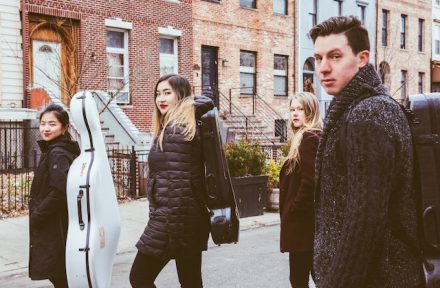Review by Seth Rogovoy
(CHATHAM, N.Y., June 24, 2022) – PS21’s House Blend concert series kicked off on Friday night with a program of music stretching across centuries, with mid-18th century works by J.S. Bach juxtaposed with mid-to-late 20th century works that offered a variety of sounds, instruments, and stylistic approaches, all comfortably united under the umbrella of chamber music and all performed at the highest degree of virtuosity.
The concert kicked off with Grammy Award-nominee Alan Feinberg at the piano for the first of two solo pieces by J.S. Bach. Feinberg’s version of Ricercar a 3 voci (1747) set the scene for the evening, laying down a basic yet sophisticated musical vocabulary that all the other pieces to be heard this evening related to in one way or another. Feinberg brought the composer’s genius to life, exploring long lines of chordal changes with persistent curiosity, working each one over in a manner that foreshadowed bebop, knocking on every door and walking down every passageway, finding and refining the infinite crevices and angles embedded in Bach’s architectural latticework. Feinberg’s piano was augmented by the call-and-response of songbirds in close proximity to the open-air Pavilion Theater, an intimate, cozy, and more acoustically satisfying version of the Koussevitzky Shed at Tanglewood.
Charles Wuorinen’s Horn Trio #1 (1981) was in bracing contrast to the Bach, a kind of musical equivalent to Piet Mondrian’s 1943 painting, Broadway Boogie Woogie, pulsing with staccato energy as the instruments – piano, violin, and horn – dueled and danced with each other. The piece opened frenetically, a kind of urban cataclysm with sounds coming at us from all dimensions, before slowing to a crawl with long, drawn-out bowed notes on violin, piano chords (produced on the keyboard and inside the piano directly on the strings) that lingered in the air until they dissipated, and the versatile horn emitting alarums, lengthy individual notes, and blowsy, drunken exclamations. The piece then gathered up another head of speed and tension, the instruments mimicking and poking fun at each other, with notes organically passed from one to the other with the agility of professional basketball or soccer players. While Miranda Cuckson’s violin playing was dazzling, Leelanee Sterrett on horn got to play all the fun parts. The piece ended with a quiet sense of serenity at the precise moment of a gorgeous red Hudson Valley sunset.
Brandon Ilaw offered a stunning display of virtuosity on Paul Lansky’s Three Moves for Marimba (1998). Ilaw evoked a deep rich sound from the instrument, opening with a jazzy melody with almost a funk-like bottom. Playing with four mallets, Ilaw captured the sensibility of a jazz trio — piano, bass, and a melody instrument, perhaps a saxophone – as he defied the instrument to stretch its tonal range to its ultimate limits, with accents and splashes of sound and rhythm. The second movement was bluesy, with more of a vocal quality recalling Billie Holiday. The concluding movement was more of a nod to a colorful minimalism, in which Ilaw relaxed a bit and let the marimba be a marimba. His was a joyous spotlight.
After Feinberg offered Ricercar a 6 voci (1747), his second Bach piano solo of the evening, more lush and “modern”-sounding than his opening piece, the Ulysses String Quartet marched us off to war with Arnold Schoenberg’s Ode to Napoleon (1942). Some people find Schoenberg to be unlistenable; I am not one of them. His music is evocative of the chaos and disorder of the early-to-mid 20th century and as such provides one example of a perfect soundtrack to the industrial war and destruction that plagued European battlefields and colonial outposts across the globe. For this listener, however, the piece is mortally bogged down by the recitation throughout, the musical equivalent of a narrative voiceover in film, which was made even worse by the difficulty of understanding just what was being said (even though it was in English). This is no fault of baritone David Adam Moore, who did what the composition required. The narrative wound up detracting from the music, which could easily have stood on its own with equal or greater emotional impact. Instead, it wound being more of a poetry reading accompanied by music than a chamber piece of remarkable suggestion incorporating spoken word.
Overall, it was a lovely evening of music at this somewhat overlooked gem of a brand-new, state-of-the-art performance space, located just a mile to the north of downtown Chatham. PS21’s summer season promises more evenings of chamber music in its House Blend Series, as well as a host of other performances including world music, dance, chamber opera, live music and film, and even a season-ending rock concert and DJ dance party.
Program
J.S Bach: Ricercar a 3 voci (1747)
Charles Wuorinen: Horn Trio #1 (1981)
Paul Lansky: Three Moves for Marimba (1998)
J.S. Bach: Ricercar a 6 voci (1747)
Arnold Schoenberg: Ode to Napoleon (1942)
Featuring the Ulysses String Quartet; Leelanee Sterrett (horn), Alan Feinberg (piano), Brandon Ilaw (percussion), Eric Huebner (Piano), and Miranda Cuckson (violin, and David Adam Moore (reciter, Ode to Napoleon)

